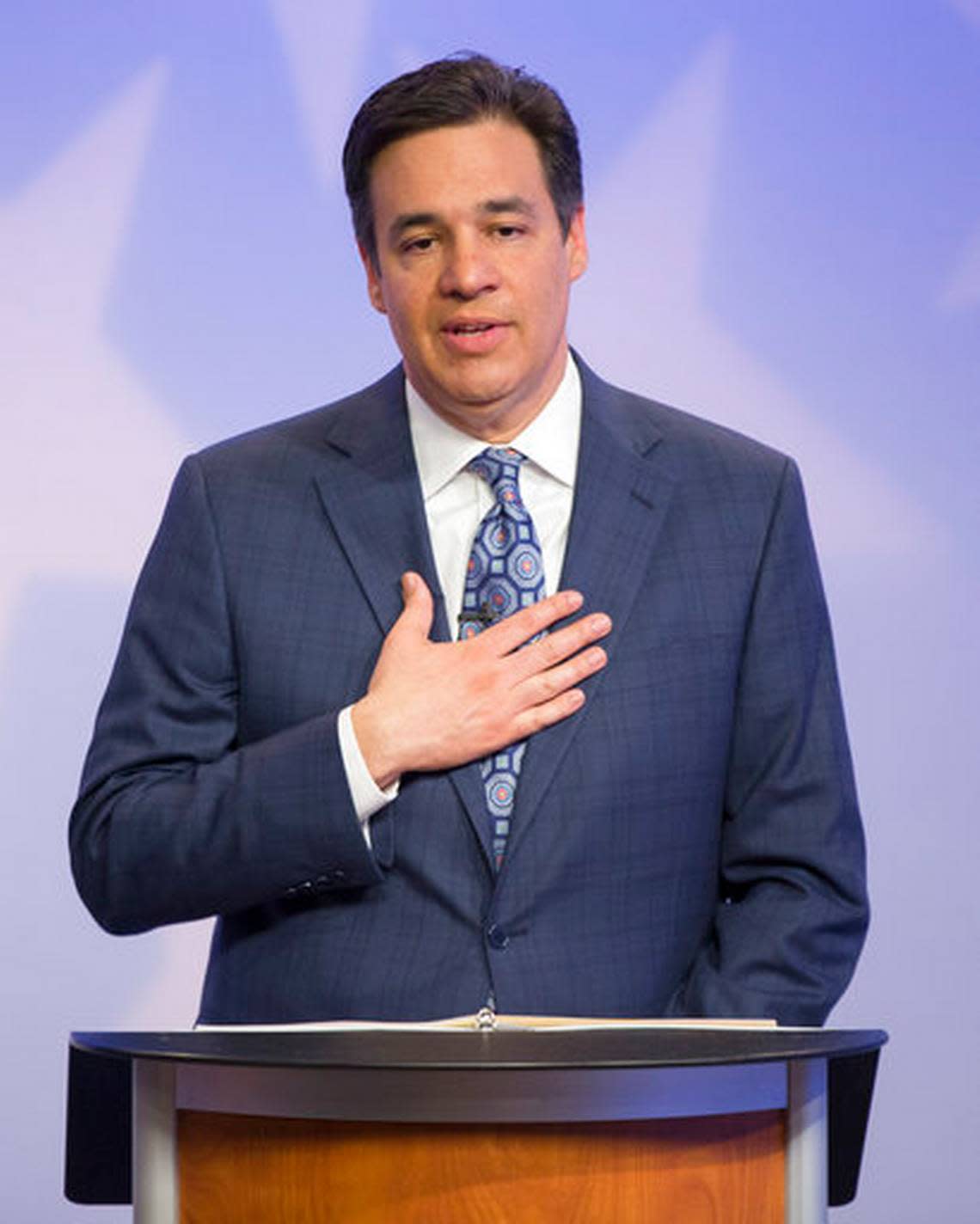Idaho AG Raúl Labrador wants to keep representing Phil McGrane in lawsuit against him

- Oops!Something went wrong.Please try again later.
- Oops!Something went wrong.Please try again later.
Idaho Attorney General Raúl Labrador wants his office to continue to represent Secretary of State Phil McGrane in a lawsuit he filed against McGrane, despite pointed questions from the state Supreme Court on whether that amounts to a conflict of interest.
Labrador sued McGrane and a coalition aiming to end Idaho’s closed primaries with a ballot initiative last week, with the goal of stopping the measure from appearing on the Nov. 5 general election ballot. Both Labrador and McGrane, as a state official, are being represented by lawyers who work for Labrador. The two elected officials in the past week have requested opposing deadlines for when the Idaho Supreme Court must make a ruling on the lawsuit.
The dual representation by the Attorney General’s Office of Labrador, the petitioner, and McGrane, a respondent, prompted the Idaho Supreme Court to openly question whether Labrador’s office was overstepping the Rules of Professional Conduct, which are the standards of behavior that all lawyers in the state must comply with.
The attorney general generally provides legal representation for state officials.
The court ordered Labrador to “show cause as to why he and the deputy attorneys general in his office should not be disqualified from representing the secretary of state” under the rules, Vice Chief Justice Robyn Brody wrote in a Monday order. She gave Labrador less than two days to provide justification.
Labrador’s office declined to comment Monday, citing the pending litigation. In his initial court filing, the attorney general’s office said McGrane’s office would be represented by different attorneys within the attorney general’s office, and that he had “implemented ethical screening procedures to ensure the secretary receives zealous representation.”
McGrane’s office also declined to comment.
Labrador, McGrane cite different timelines
Labrador argued that the measure runs afoul of the state constitution and used signatures that were deceptively collected by the coalition, Idahoans for Open Primaries. The group’s spokesperson, Luke Mayville, has denied those allegations and called the lawsuit from Labrador a “political stunt” that is an “insult to the thousands of ordinary people who volunteered their time to collect signatures.”
With less than four months before Election Day, Labrador’s petition to the Idaho Supreme Court would need to be expedited for a resolution to come before voters cast their ballots. But the attorney general requested a longer timeline than what McGrane thinks the state needs.
Labrador’s office asked the Supreme Court to hear oral arguments on Aug. 23, and to issue a final decision on Sept. 6, which is a day before the secretary of state is required by law to submit the ballot initiative to the county clerks, according to court filings.
But McGrane said the case needs to be decided much faster: by Aug. 8, in time for his office to mail 850,000 voter pamphlets about the initiative — which are also required by law — to households across the state. The printing of those pamphlets takes a month, and the state’s printer has said it needs the final text no later than Aug. 9, according to filings.
In response to that argument, lawyers for Labrador objected and again argued that a six-week timeline was appropriate.
If McGrane starts printing the pamphlet with the initiative on it, and the measure is later found to be invalid, “then the only consequence of its inclusion in the pamphlet will be that its sponsors get free advertising for their next attempt,” one filing said. It added that the case “raises extremely important issues” and that “finances are not the most important matter at stake.”
The secretary of state shot back in another filing that printing pamphlets before the matter is resolved would waste taxpayer money and potentially confuse voters, who might see a ballot measure on their informational pamphlet and then not on their November ballot.
“If ... the most important thing here is for the court to have sufficient time, then why should this matter be expedited at all?” the filing said.
‘The conflict is so obvious’
Benjamin Cover, a law professor at the University of Idaho who specializes in election law, told the Statesman the situation appeared very likely to conflict with the rules of professional conduct.
“It looks like the sort of conflict that can’t be waived, and it looks like the sort of conflict that applies not just to one lawyer but to every lawyer in the office,” he said, noting that the request from the court was unusual.
“The conflict is so obvious that the Idaho Supreme Court is affirmatively asking for clarification, (saying) ‘What is going on here, how can you possibly represent the secretary of state in this case?’” he said.
Cover said it was also potentially problematic that McGrane had not been previously informed of the case by Labrador’s office. McGrane told the Statesman that he had only learned about the lawsuit through the newspaper’s inquiry the day the lawsuit was filed.
The initial lawsuit was nearly 200 pages and had five sworn statements from voters. As soon as the attorney general’s lawyers contemplated filing a lawsuit, Labrador’s attorneys should have discussed its impact on the secretary of state and whether he needed an independent attorney, Cover said.
“They’ve clearly been working on this for a while,” he said. “The secretary of state is their client, and they need to help their client do their job. And part of that is making sure the secretary of state meets these really important election deadlines.”

